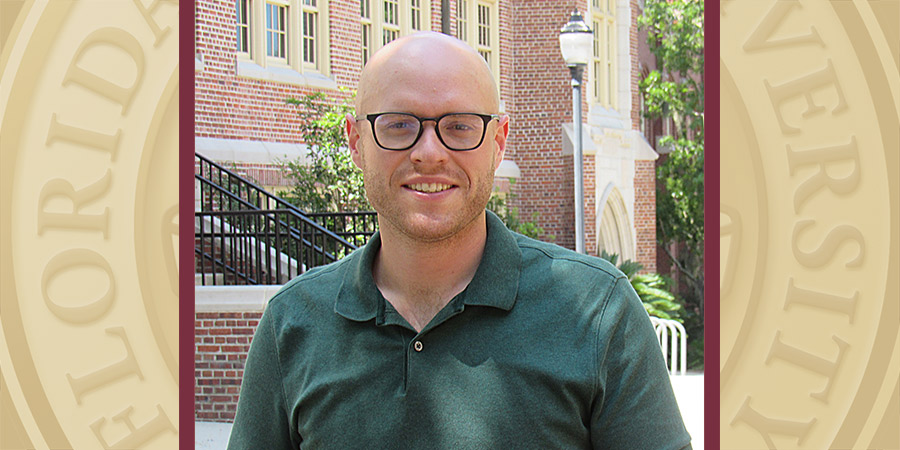
A Florida State University English doctoral candidate has been awarded a grant from the National Endowment for the Humanities (NEH) to improve accessibility of graphic and visual narratives for blind and low-vision readers.
Aaron Rodriguez, doctoral candidate in FSU's History of Text Technologies Program, was awarded a $99,915 Digital Humanities Advancement Grant to develop and release a beta-level app for blind and low-vision readers to enhance their accessibility to graphic and visual narratives.
Rodriguez shares the grant with Wichita State University Professor of English Darren DeFrain. The two will continue work on the Vizling App that was initiated when Rodriguez was a master's student at Wichita State.
"When I started teaching, I had a student who had a macular hole and she was struggling to read comics in my class, and all the translation technology didn't really work," Rodriguez said. "She could still generally see what was happening on the page, but she couldn't focus on the words and the speech bubbles. She could generally understand what was going on, so this app would work well for her."
The app offers a touch-screen option for the blind and visually impaired to explore comics in three ways: global narrative or audiobook, narrative-grammar or panel-to-panel reading, and free exploration mode. In a short video tutorial, Rodriguez showed how the audio descriptions of the page content are activated by dragging a finger across the screen and stopping on a panel, a speech bubble or an object on the page.
The NEH awarded 20 Digital Humanities Advancement Grants, totaling $2.3 million. The funds, according to the NEH, support the implementation of innovative digital humanities projects that have successfully completed a start-up phase and demonstrated their value to the field.
Rodriguez said that while Vizling's target audience is teachers, individuals can use the app as well. He points out that this technology is crucial as higher education institutions continue to comply with the Americans with Disabilities Act, and that he and DeFrain are considering ways to make the app's functions more universal.
"We're using Vizling for comics, but we could conceivably embed this in Canvas, and then any instructor could take a multi-modal image and make that accessible," Rodriguez said. "Thinking about a biology textbook, and if you're explaining mitosis, the image has a lot more meaning than the corresponding text. We could translate that to a way that is more accessible, not necessarily visual, but emphasizing the spatial nature of how the information is organized on the page."
Krafft Professor of English Anne Coldiron is co-directing Rodriguez' doctoral dissertation, which specializes in text technologies. She said his success is not surprising to her.
"His work has a lot of qualities that the wider world needs," Coldiron said. "Aaron has excelled in my History of Text Technologies graduate seminars. His work interrogates the importance not just of media in literature but of entire systems of textual production, distribution and reception through which literary cultures are created."
Rodriguez' studies in Coldiron's seminars have stretched from ancient inscriptions on stone to contemporary XML. He also has worked on medieval manuscripts and early modern incunables, or early printed books.
"He always historicizes and yet is transhistorical; he is attuned to historical contexts but thinks and works across period lines," Coldiron said. "He has great digital chops and creativity, as the NEH project shows. He genuinely wants to learn and to contribute - this is not just about checking credential boxes for him."
Robert O. Lawton Professor of English Gary Taylor is Rodriguez' second dissertation director. Rodriguez said he chose FSU for his Ph.D. program because of Taylor's expertise in History of Text Technologies. Taylor also is known worldwide for his work on Shakespeare and his contemporaries.
"For my doctoral preliminaries and my dissertation, he's helped me figure how we can make Vizling, which has nothing to do with Shakespeare, have uses for Shakespeare productions," Rodriguez said. "I'm now interested in how I can apply this app to theater, which I never thought about before. Both page layouts and stage layouts are static, so if you're visually impaired, you're not going to be able to see. But that spatial layout is important for the viewer of the play."






